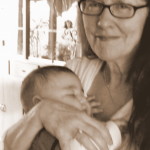 No lessons learned without love touch your heart. No lessons that do not touch your heart will accomplish anything. C:24.4
No lessons learned without love touch your heart. No lessons that do not touch your heart will accomplish anything. C:24.4
A Course of Love returns us to the idea that love gives reason its foundation. As soon as we begin A Course of Love, we see we’re asked not to use our usual means of taking a course, but instead to let our heart be our eyes and ears. A willingness to do that is really all that is required, because once our hearts become central, we easily realize that our hearts have their own way of knowing, and that it is a knowing that it is essential—a knowing that we crave and yet possess. The heart’s knowing is the source of our longing for freedom, of our desire to love and be loved, of our appreciation of beauty and justice, and of our devotion in relationships. To be who we are in a way that does not disregard either our humanity or our divinity, a way that does not disregard each other and the world, we need to start with our hearts. If we do that, our minds will join with our hearts in wholeheartedness, and our reason will be compassionate as well as intelligent and inspired.
Since Mother’s Day is a somewhat arbitrary holiday that often relies on the “sentiment” of love, I thought it would be a good time to mention this expanded view of love.
The world evidenced by society, by education that has become training for jobs, by the goals that are instilled very young—goals that are about achievement of the good life (as defined by intellectual or professional achievement, wealth, power, or even consumer goods), is a world that holds love separate from all “but” those nearest and dearest. Love is just not particularly relevant elsewhere. This love-less and practical society suggests the acquisition of a “good life” that is not easy to see through, and a way of living that can’t be reversed until there is an awareness of the limitations such a life imposes. I believe these “limits” that are not seen, are what are found within special relationships . . . until we see them. Awareness is key. When we see through them, our love expands and we are released from our prior limits! Not from the “actualness” of relationships, but merely from their “specialness.”
When our hearts are deeply touched, our longing for a life of love does naturally extend, and is given space in which it can be remembered, imagined into being, and demonstrated newly. The giving up of special relationships, asked of us in this Course (as well as ACIM) is one of the hardest ideas to accept, and yet has more to do with expanding our reach than with limiting it.
given space in which it can be remembered, imagined into being, and demonstrated newly. The giving up of special relationships, asked of us in this Course (as well as ACIM) is one of the hardest ideas to accept, and yet has more to do with expanding our reach than with limiting it.
In contemplating these things on this eve of Mother’s Day, I am wishing you each heart touching moments as mothers, grandmothers, daughters, sons, and husbands. And I don’t mean greeting card moments. I am wishing for us each to see and feel universal love in the most intimate of ways, to extend the love and the awareness of love’s reach we have gained into the world, and . . . to give, within our families, a love that gives our home “here” its foundation, and renews life with its limitless reach.


ACOL’s illumination on “special relationships” is one of the most profound teachings in the Course for me. At first the material was ever so confusing, but after living with it a few months, I could ‘get’ it. Particularly useful was the message that in our “special” relationships we enslave each other, expecting certain behaviors and giving certain behaviors that we feel would keep the person we wanted to have near us happy.
“Special love” has been such an elusive goal and I’ve failed at it because eventually I get angry when things aren’t going my way and I don’t feel appreciated in the way I want to feel appreciated. Love has been such a quest in my life: How to recognize love, how to receive love, how to give love. I even wrote a book titled: “Love After Love: Stages of Loving.” It isn’t until recently that my heart has found rest in what ACOL counsels, and the love that has no opposite is becoming a felt reality in my life. What a liberation!